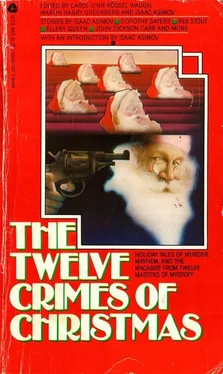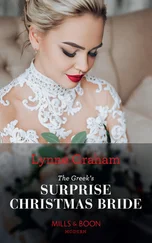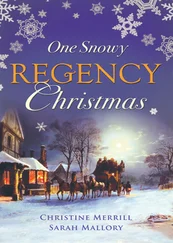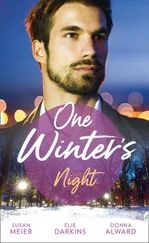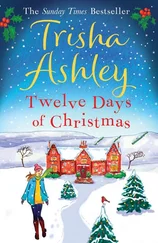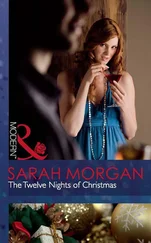Carol-Lynn Waugh - The Twelve Crimes of Christmas
Здесь есть возможность читать онлайн «Carol-Lynn Waugh - The Twelve Crimes of Christmas» весь текст электронной книги совершенно бесплатно (целиком полную версию без сокращений). В некоторых случаях можно слушать аудио, скачать через торрент в формате fb2 и присутствует краткое содержание. Жанр: Триллер, на английском языке. Описание произведения, (предисловие) а так же отзывы посетителей доступны на портале библиотеки ЛибКат.
- Название:The Twelve Crimes of Christmas
- Автор:
- Жанр:
- Год:неизвестен
- ISBN:нет данных
- Рейтинг книги:3 / 5. Голосов: 1
-
Избранное:Добавить в избранное
- Отзывы:
-
Ваша оценка:
- 60
- 1
- 2
- 3
- 4
- 5
The Twelve Crimes of Christmas: краткое содержание, описание и аннотация
Предлагаем к чтению аннотацию, описание, краткое содержание или предисловие (зависит от того, что написал сам автор книги «The Twelve Crimes of Christmas»). Если вы не нашли необходимую информацию о книге — напишите в комментариях, мы постараемся отыскать её.
The Twelve Crimes of Christmas — читать онлайн бесплатно полную книгу (весь текст) целиком
Ниже представлен текст книги, разбитый по страницам. Система сохранения места последней прочитанной страницы, позволяет с удобством читать онлайн бесплатно книгу «The Twelve Crimes of Christmas», без необходимости каждый раз заново искать на чём Вы остановились. Поставьте закладку, и сможете в любой момент перейти на страницу, на которой закончили чтение.
Интервал:
Закладка:
Although one snowflake had already sifted past the lights, the great doors of the house stood open. It seemed less a snowflake than a shadow; for a bitter wind whipped after it, and the doors creaked. Inside, Rodney and Muriel Hunter could see a dingy, narrow hall paved in dull red tiles, with a Jacobean staircase at the rear. (At that time, of course, there was no dead woman lying inside.)
To find such a place in the loneliest part of the Weald of Kent-a seventeenth-century country house whose floors had grown humped and its beams scrubbed by the years-was what they had expected. Even to find electricity was not surprising. But Rodney Hunter thought he had seldom seen so many lights in one house, and Muriel had been equally startled by the display. “Clearlawns” lived up to its name. It stood in the midst of a slope of flat grass, now wiry white with frost, and there was no tree or shrub within twenty yards of it. Those lights contrasted with a certain inhospitable and damp air about the house as though the owner were compelled to keep them burning all the time.
“But why is the front door open?” insisted Muriel.
In the driveway, the engine of their car coughed and died. The house was now a secret blackness of gables, emitting light at every chink, and silhouetting the stalks of the wisteria vines which climbed it. On either side of the front door were little-paned windows, whose curtains had not been drawn. Towards their left they could see into a low dining room, with table and sideboard set for a cold supper; towards their right was a darkish library moving with the reflections of a bright fire.
The sight of the fire warmed Rodney Hunter, but it made him feel guilty. They were very late. At five o’clock, without fail, he had promised Jack Bannister, they would be at “Clearlawns” to inaugurate the Christmas party.
Engine trouble in leaving London was one thing; idling at a country pub along the way, drinking hot ale and listening to the wireless sing carols until a sort of Dickensian jollity stole into you, was something else. But both he and Muriel were young; they were very fond of each other and of things in general; and they had worked themselves into a glow of Christmas, which-as they stood before the creaking doors of “Clearlawns”-grew oddly cool.
There was no real reason, Rodney thought, to feel disquiet. He hoisted their luggage, including a big box of presents for Jack and Molly’s children, out of the rear of the car. That his footsteps should sound loud on the gravel was only natural. He put his head into the doorway and whistled. Then he began to bang the knocker. Its sound seemed to seek out every corner of the house and then come back like a questing dog; but there was no response.
“I’ll tell you something else,” he said. “There’s nobody in the house.”
Muriel ran up the three steps to stand beside him. She had drawn her fur coat close around her, and her face was bright with cold.
“But that’s impossible!” she said. “I mean, even if they’re out, the servants-! Molly told me she keeps a cook and two maids. Are you sure we’ve got the right place?”
“Yes. The name’s on the gate, and there’s no other house within a mile.”
With the same impulse they craned their necks to look through the windows of the dining room, on the left. Cold fowl on the sideboard, a great bowl of chestnuts; and, now they could see it, another good fire, before which stood a chair with a piece of knitting put aside on it. Rodney tried the knocker again, vigorously, but the sound was all wrong. It was as though they were even more lonely in that core of light, with the east wind rushing across the Weald, and the door creaking again.
“I suppose we’d better go in,” said Rodney. He added, with a lack of Christmas spirit: “Here, this is a devil of a trick! What do you think has happened? I’ll swear that fire has been made up in the last fifteen minutes.”
He stepped into the hall and set down the bags. As he was turning to close the door, Muriel put her hand on his arm.
“I say, Rod. Do you think you’d better close it?”
“Why not?”
“I-I don’t know.”
“The place is getting chilly enough as it is,” he pointed out, unwilling to admit that the same thought had occurred to him. He closed both doors and shot their bar into place; and, at the same moment, a girl came out of the door to the library, on the right.
She was such a pleasant-faced girl that they both felt a sense of relief. Why she had not answered the knocking had ceased to be a question; she filled a void. She was pretty, not more than twenty-one or -two, and had an air of primness which made Rodney Hunter vaguely associate her with a governess or a secretary, though Jack Bannister had never mentioned any such person. She was plump, but with a curiously narrow waist; and she wore brown. Her brown hair was neatly parted, and her brown eyes-long eyes, which might have given a hint of secrecy or curious smiles if they had not been so placid-looked concerned. In one hand she carried what looked like a small white bag of linen or cotton. And she spoke with a dignity which did not match her years.
“I am most terribly sorry,” she told them. “I thought I heard someone, but I was so busy that I could not be sure. Will you forgive me?”
She smiled. Hunter’s private view was that his knocking had been loud enough to wake the dead; but he murmured conventional things. As though conscious of some faint incongruity about the white bag in her hand, she held it up.
“For Blind Man’s Bluff,” she explained. “They do cheat so, I’m afraid, and not only the children. If one uses an ordinary handkerchief tied round the eyes, they always manage to get a corner loose. But if you take this, and you put it fully over a person’s head, and you tie it round the neck”-a sudden gruesome image occurred to Rodney Hunter-“then it works so much better, don’t you think?” Her eyes seemed to turn inward, and to grow absent. “But I must not keep you talking here. You are-?”
“My name is Hunter. This is my wife. I’m afraid we’ve arrived late, but I understood Mr. Bannister was expecting-”
“He did not tell you?” asked the girl in brown.
“Tell me what?”
“Everyone here, including the servants, is always out of the house at this hour on this particular date. It is the custom; I believe it has been the custom for more than sixty years. There is some sort of special church service.”
Rodney Hunter’s imagination had been devising all sorts of fantastic explanations, the first of them being that this demure lady had murdered the members of the household and was engaged in disposing of the bodies. What put this nonsensical notion into his head he could not tell, unless it was his own profession of detective-story writing. But he felt relieved to hear a commonplace explanation. Then the woman spoke again.
“Of course, it is a pretext, really. The rector, that dear man, invented it all those years ago to save embarrassment. What happened here had nothing to do with the murder, since the dates were so different; and I suppose most people have forgotten now why the tenants do prefer to stay away during seven and eight o’clock on Christmas Eve. I doubt if Mrs. Bannister even knows the real reason, though I should imagine Mr. Bannister must know it. But what happens here cannot be very pleasant, and it wouldn’t do to have the children see it-would it?”
Muriel spoke with such sudden directness that her husband knew she was afraid. “Who are you?” Muriel said. “And what on earth are you talking about?”
“I am quite sane, really,” their hostess assured them, with a smile that was half-cheery and half-coy, “I dare say it must be all very confusing to you, poor dear. But I am forgetting my duties. Please come in and sit down before the fire, and let me offer you something to drink.”
Читать дальшеИнтервал:
Закладка:
Похожие книги на «The Twelve Crimes of Christmas»
Представляем Вашему вниманию похожие книги на «The Twelve Crimes of Christmas» списком для выбора. Мы отобрали схожую по названию и смыслу литературу в надежде предоставить читателям больше вариантов отыскать новые, интересные, ещё непрочитанные произведения.
Обсуждение, отзывы о книге «The Twelve Crimes of Christmas» и просто собственные мнения читателей. Оставьте ваши комментарии, напишите, что Вы думаете о произведении, его смысле или главных героях. Укажите что конкретно понравилось, а что нет, и почему Вы так считаете.
